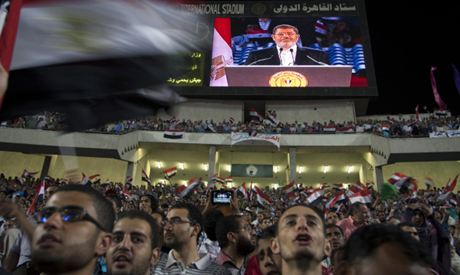
Egypt's President Mohamed Morsi used celebrations to mark the 39th anniversary of the 1973 war against Israel on Saturday to highlight the successes and failures of his first 100 days in office.
Morsi's hour-and-a-half long speech, to around 60,000 people at the Cairo Stadium, was the first of its kind in decades.
Former president Hosni Mubarak had avoided participating in open-air celebrations of the October War after his predecessor, Anwar Sadat, was assassinated at the 1981 military parade marking the anniversary.
The annual celebration, organised this year under the heading of "An army which protects and a People who build," commemorates the day Egypt launched a surprise attack against Israeli forces which had occupied the Sinai Peninsula since 1967.
Morsi arrived at the stadium in a motorcade and waved to the enthusiastic crowds which included many members of the president's own Freedom and Justice Party.
Morsi applauded the wise leaders who planned and executed the Egyptian war plans, but stopped short of mentioning former president Sadat or Israel.
Simultaneously, the president took at swipe at ousted president Hosni Mubarak for using his role in the war as commander of the airforce to garner political capital, but, again, avoided using his name.
A notable attendee was Tarek El-Zoumar, a member of Al-Jamaa Al-Islamiya, who was sentenced to life imprisonment for his role in the assassination of President Sadat in 1981.
El-Zoumar was released after the 2011 uprising along with other Islamist figures.
A number of Mubarak-era political figures were present, including ex-minister of international cooperation Fayza Abul Naga.
"The 1973 war was a historic victory that restored the dignity of all Egyptians," he said at the beginning of his speech, before discussing his 100-day plan which ends on Monday.
The plan, which Morsi vowed to put in effect when elected in late June, focussed on tackling traffic congestion, fuel and bread shortages, public sanitation and the security vacuum.
"Seventy per cent of the security improvements targeted in the 100-day plan were achieved," he said, and thanked the interior ministry for its efforts.
Concerning fuel shortages, Morsi stated that: “Two officials at the petroleum ministry were involved in smuggling fuel out of Egypt and investigations are ongoing,” and noted that the authorities are still trying to contain the problem.
“Forty per cent of the public sanitation targets have been achieved," Morsi claimed, "with 600,000 tonnes of garbage being removed from Cairo and Giza... 200,000 tonnes from Alexandria and 350,000 tonnes from the remaining governorates.”
He urged Egyptians to stop throwing litter in the street and to abide by traffic laws: “During the past 100 days drivers committed more than 1.5 million traffic violations," which adds to chronic congestion problems.
Morsi said: “80 per cent of the targets aimed at ending bread shortages have been achieved.”
Moving on to economic matters, the president said: “The potential IMF loan is not religiously forbidden. We would prefer hunger to usury.”
Islamists have traditionally deemed loans which accrue interest rates anti-Islamic and some have criticised Morsi for his pursuit of the loan to help revive Egypt's economy.
Prime Minister Hisham Qandil, Interior Minister Mohamed Gamal and former parliamentary speaker Saad El-Katatni were among the leading political figures at the event.
No comments:
Post a Comment